From 11 November CQC registered care homes will only be able to use staff to provide care who can produce evidence that they have had two doses of the COVID-19 vaccine (or are medically exempt).
Two care workers are currently seeking a judicial review of this requirement on five separate grounds and want the courts to quash the mandatory vaccination regulations. The judicial review application was presented on 9 September and, as it is likely that permission for the application will go ahead and the substantive arguments will be considered together as part of an expedited hearing, the issue should be resolved over the next few weeks.
In the meantime, care homes are receiving grievances and whistleblowing complaints from staff who object to having the vaccine. To be fully vaccinated by 11 November, the last day by which care staff should have had their first vaccination dose (16 September) has already passed so there will already be some employees who will not meet the double vaccination requirement by the designated timeframe.
Care homes need to ensure that all grievances and whistleblowing complaints are dealt with properly to minimise the risk of successful tribunal claims. It will be possible to justify a mandatory vaccination policy on the grounds that it is a legal obligation to have one, but employers must still ensure that they use a fair process to deal with the staffing issues that may arise.
Keeping on top of the Department for Health and Social Security (DHSC) operational guidance is essential. Only recently (15 September) the DHSC published a letter setting out how, on a temporary basis, people working or volunteering in care homes and who cannot have a Covid-19 vaccine for a medical reason can self-certify that they meet the medical exemption criteria.
DHSC has issued a self-certification form for people with medical exemptions to use on a temporary basis prior to the launch of the NHS Covid Pass system. Once the Pass system has been launched a formal medical exemption will be needed and any self-certification will expire after 12 weeks.
Individuals who have received a Covid-19 vaccination abroad can self-certify as medically exempt via the self-certification form. The form notes that this temporary exemption may expire once further guidance is issued and continued deployment in a care home may depend on a complete course of an authorised Covid-19 vaccination.
Time-limited exemptions are also available for those with short-term medical conditions (for example, people receiving hospital care or receiving medication which may interact with the vaccination), and for pregnant women should they choose to take it.
The self-certification form makes it clear that the person signing it acknowledges that providing false information may result in disciplinary action.
Meanwhile, following the consultation issued by the government on 9 September, it seems that the mandatory vaccination requirement is likely be extended to all frontline workers in health and social care settings in England. The consultation looks at whether the mandatory vaccination requirement should be extended to all frontline workers in health and social care settings in England. This may extend to services providing extra care and supported housing, and under 18s who are deployed to undertake direct treatment or personal care as part of a CQC regulated activity. The consultation also asks whether the flu jab should be made mandatory, as well as any Covid-19 booster. Recent research has shown that people infected with both flu and Covid-19 are more than twice as likely to die as someone with Covid-19 alone. The consultation closes on 22 October.

